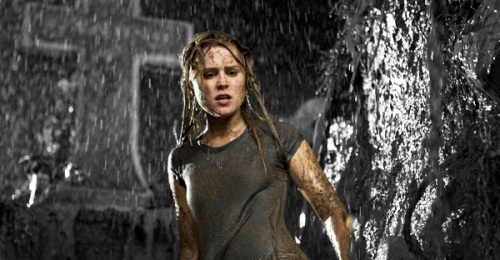It’s not often a modern horror film garners universal acclaim from the critics of the world, a mob collectively cynical about the modern horror form, and consistently bored by the narrative weakness often inherent in it.
They tend to be too wary of the typical over-reliance on cheap thrills, loud noises, and grotesque bloodwork. They don’t like the cheap tricks. They yearn for the slow burn of Hitchcock, the semi-cerebral murderousness of Wes Craven — even the cold, clinical effectiveness of John Carpenter.
It’s a little surprising then to see Sam Raimi’s Drag Me To Hell so consistently lauded. Dana Stevens at Slate called it a ‘brilliantly nasty little horror film.’ Scott Tobias at the The Onion A.V. Club labelled it ‘distinctly unburdened and fun.’ Jeannette Catsoulis at The New York Times claims the film has a ‘tonic playfulness that’s unabashedly retro.’
Those reviews are representative of a wider feeling that Drag Me To Hell is somehow a return to form; not just for Raimi (who has helmed the last three Spiderman films, to fantastic commercial and sporadically critical success), but for the horror genre itself.
The overwhelming positivity seems to stem from the winking, knowing, playfully bombastic tone of the film, with its cheap 80s-esque special effects, and plot transplanted from a 1950s pulp novel. (The name of the film — so charmingly ridiculous — offers the first clue that you’ll need to watch it with your tongue planted firmly in your cheek).
More than anything, critics seem relieved that they’re not being actively tortured. ‘Unlike so much contemporary horror,’ writes Stephanie Zacharek of Salon, the film is ‘devoid of sadism and mean-spiritedness.’
The hypersadism of, say, Alexandra Aja (who helmed 2006’s surprisingly effective remake of Craven’s The Hills Have Eyes) or Eli Roth (the over-hyped, oddly monotonous Hostel, 2005) is replaced by Raimi’s obvious delight at playing with the conventions of modern horror — or, more accurately, completely subverting them.
The evil in Drag Me To Hell manifests not as a machete-sporting, disfigured abomination, nor a slit-eyed killer with a lust for teenage blood. No, Raimi leaves it largely unseen, hinted at by whispers and shadows. It is a corny, romantic kind of evil, based in the hoodoo of Victorian lore more than the celluloid freaks and ghouls we’re typically offered.
Which makes sense. Raimi is, of course, the man who directed the Evil Dead series — a trilogy that became progressively more ridiculous and campy until, in the third chapter (1992’s Army Of Darkness), we’re treated to plastic skeletons marauding around with swords, and star Bruce Campbell explaining his shotgun to confused citizens of the medieval age: ‘this is my boomstick!’
The spectacular chin, and career-defining, brilliantly pompous performance of Campbell made it clear to audiences that Evil Dead II and Army Of Darkness were supposed to be preposterous.
Drag Me To Hell, for many audience members I attended the film with, lacked similar signifiers. Many missed the joke. One openly wondered, as the credits rolled, whether this was ‘one of the worst films ever made.’
Of course, it’s not. But to enjoy the film, as most critics have, requires a sympathetic audience. It demands that the audience revel in the silliness of a loan manager stapling the head of a one-eyed gypsy woman in a carpark. It needs viewers just as prepared to howl in delight as in fear.
The effects are almost uniformly terrible; one notable highlight being hell itself rendered like a bad Photoshop.
The script is often (charmingly) atrocious, demanding Justin Long and Alison Lohman deliver ham-fisted sentimentality with square-jawed seriousness and steely-eyed resolve.
But it works. Drag Me To Hell is a bad film done very well, by a director sure of what tone he wants, and how he’ll get it. Raimi treats very silly material — a possessed, talking goat in one scene — with the utmost respect. And the results are schlocky, and decadently ridiculous.
Posted By: Anton


